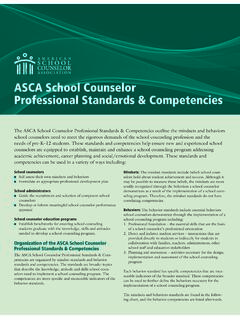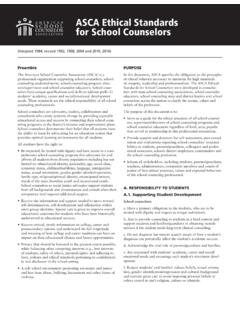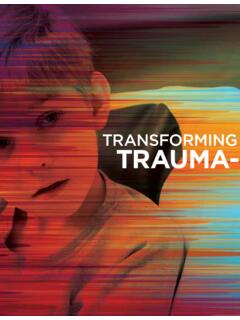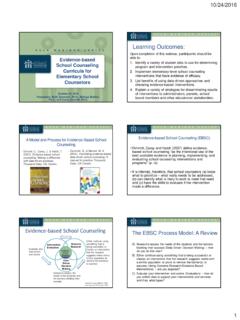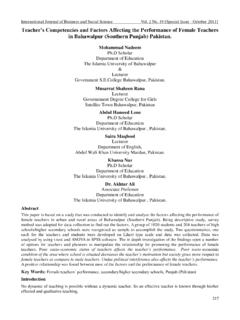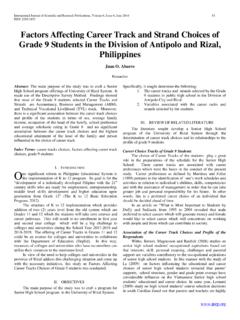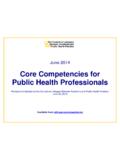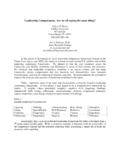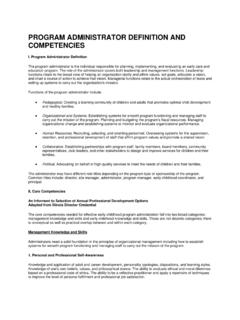Transcription of ASCA School Counselor Professional Standards & …
1 ASCA School Counselor Professional Standards & competencies 1 The ASCA School Counselor Professional Standards & competencies outline the mindsets and behaviors School counselors need to meet the rigorous demands of the School counseling profession and the needs of pre-K 12 students. These Standards and competencies help ensure new and experienced School counselors are equipped to establish, maintain and enhance a School counseling program addressing academic achievement, career planning and social/emotional development. These Standards and competencies can be used in a variety of ways including:ASCA School Counselor Professional Standards & CompetenciesMindsets: The mindset Standards include beliefs School coun-selors hold about student achievement and success.
2 Although it may be possible to measure these beliefs, the mindsets are more readily recognized through the behaviors a School Counselor demonstrates as a result of the implementation of a School coun-seling program. Therefore, the mindset Standards do not have correlating : The behavior Standards include essential behaviors School counselors demonstrate through the implementation of a School counseling program including:1. Professional foundation the essential skills that are the basis of a School Counselor s Professional orientation2. Direct and indirect student services interactions that are provided directly to students or indirectly for students in collaboration with families, teachers, administrators, other School staff and education stakeholders3.
3 Planning and assessment activities necessary for the design, implementation and assessment of the School counseling programEach behavior standard has specific competencies that are mea-surable indicators of the broader standard. These competencies can be used to further define the behaviors necessary for the implementation of a School counseling mindsets and behaviors Standards are found in the follow-ing chart, and the behavior competencies are listed counselorsn Self-assess their own mindsets and behaviorsn Formulate an appropriate Professional development planSchool administratorsn Guide the recruitment and selection of competent School counselorsn Develop or inform meaningful School Counselor performance appraisalSchool Counselor education programsn Establish benchmarks for ensuring School counseling students graduate with the knowledge.
4 Skills and attitudes needed to develop a School counseling of the ASCA School Counselor Professional Standards & CompetenciesThe ASCA School Counselor Professional Standards & Com-petencies are organized by mindset Standards and behavior Standards and competencies . The Standards are broader topics that describe the knowledge, attitude and skills School coun-selors need to implement a School counseling program. The competencies are more specific and measurable indicators of the behavior School Counselor Professional Standards & competencies 2 ASCA School Counselor Professional Standards & CompetenciesMINDSETSS chool counselors believe:M 1. Every student can learn, and every student can 2.
5 Every student should have access to and opportunity for a high-quality 3. Every student should graduate from high School prepared for postsecondary 4. Every student should have access to a School counseling 5. Effective School counseling is a collaborative process involving School counselors, students, families, teachers, administrators, other School staff and education 6. School counselors are leaders in the School , district, state and 7. School counseling programs promote and enhance student academic, career and social/emotional counselors demonstrate the following Standards in the design, implementation and assessment of a School counseling FoundationDirect and Indirect Student ServicesPlanning and AssessmentB-PF 1.
6 Apply developmental, learning, counseling and education theoriesB-SS 1. Design and implement instruction aligned to ASCA Mindsets & Behaviors for Student Success in large-group, classroom, small-group and individual settingsB-PA 1. Create School counseling program beliefs, vision and mission statements aligned with the School and districtB-PF 2. Demonstrate understanding of educational systems, legal issues, policies, research and trends in educationB-SS 2. Provide appraisal and advisement in large-group, classroom, small-group and individual settingsB-PA 2. Identify gaps in achievement, attendance, discipline, opportunity and resourcesB-PF 3. Apply legal and ethical principles of the School counseling professionB-SS 3.
7 Provide short-term counseling in small-group and individual settingsB-PA 3. Develop annual student outcome goals based on student dataB-PF 4. Apply School counseling Professional Standards and competenciesB-SS 4. Make referrals to appropriate School and community resourcesB-PA 4. Develop and implement action plans aligned with annual student outcome goals and student dataB-PF 5. Use ASCA Mindsets & Behaviors for Student Success to inform the implementation of a School counseling programB-SS 5. Consult to support student achievement and successB-PA 5. Assess and report program results to the School communityB-PF 6. Demonstrate understanding of the impact of cultural, social and environmental influences on student success and opportunitiesB-SS 6.
8 Collaborate with families, teachers, administrators, other School staff and education stakeholders for student achievement and successB-PA 6. Use time appropriately according to national recommendations and student/ School dataB-PF 7. Demonstrate leadership through the development and implementation of a School counseling programB-PA 7. Establish agreement with the principal and other administrators about the School counseling programB-PF 8. Demonstrate advocacy for a School counseling programB-PA 8. Establish and convene an advisory council for the School counseling programB-PF 9. Create systemic change through the implementation of a School counseling programB-PA 9.
9 Use appropriate School Counselor performance appraisal processASCA School Counselor Professional Standards & competencies 3 Professional FOUNDATION B-PF 1. Apply developmental, learning, counseling and education theoriesa. Use human development theories to have an impact on de-velopmental issues affecting student successb. Use learning theory to support student achievement and success, including students with diverse learning needsc. Use established and emerging evidence-based counseling theories and techniques that are effective in a School setting to promote academic, career and social/emotional develop-ment, including but not limited to rational emotive behavior therapy, reality therapy, cognitive-behavioral therapy, Ad-lerian, solution-focused brief counseling, person-centered counseling and family systemsd.
10 Use counseling theories and techniques in individual, small-group, classroom and large-group settings to promote academic, career and social/emotional developmente. Use career development theories to promote and support postsecondary planningf. Use principles of multitiered systems of support within the context of a School counseling program to provide instruc-tion and interventions matched to student needB-PF 2. Demonstrate understanding of educational systems, legal issues, policies, research and trends in educationa. Explain the organizational structure and governance of the American educational system as well as cultural, political and social influences on current educational practicesb.
